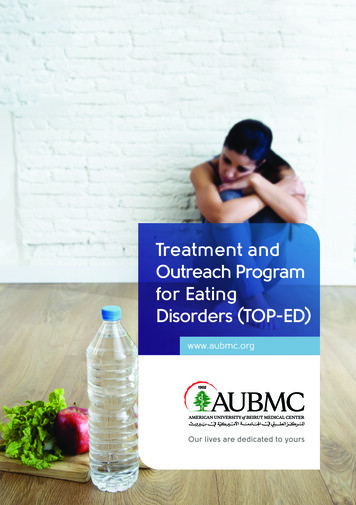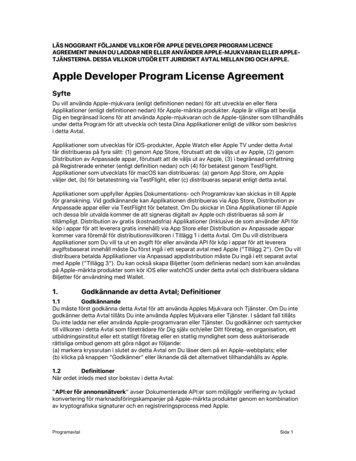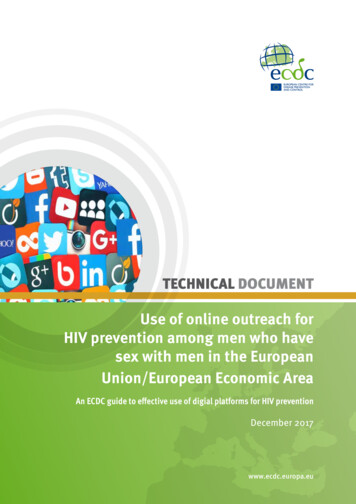
Transcription
Treatment andOutreach Programfor EatingDisorders (TOP-ED)www.aubmc.org
Copyright 2017 American University of Beirut. All rights reserved.
1What Are Eating Disorders?Eating disorders are disturbances in attitudes and behaviors related to eating, weight, andbody image. They are associated with medical and mental health complications. Individualswith eating disorders often experience other psychiatric disorders including depression,anxiety, or substance use. Eating disorders are serious but treatable mental illnesses whichcan affect people of all age, race, gender, ethnic, and socioeconomic groups.There are different types of eating disorders all of which warrant early professional help.These include: Anorexia Nervosa: Individuals experiencing Anorexia Nervosa are preoccupied withweight loss. They typically impose strict dietary and possibly compensatory behaviors(e.g. excessive exercising, self-induced vomiting, misuse of laxatives, diuretics or dietpills) leading to significant weight loss. Bulimia Nervosa: Individuals experiencing Bulimia Nervosa are also preoccupiedwith weight loss. They engage in a cycle of bingeing behaviors (overindulgencein eating, typically over a short period of time) accompanied by a feeling of lossof control, guilt, and shame. The bingeing behaviors are followed with any of thecompensatory behaviors described above. Their weight often fluctuates, yet it mayremain within a normative range. Binge Eating Disorder: Individuals experiencing Binge Eating Disorder engage inbinge eating behavior. Unlike individuals with Bulimia Nervosa, they do not engage incompensatory behaviors. Other Specified Feeding and Eating Disorders (OSFED): Individuals diagnosed withOSFED are those who display disordered eating behaviors that do not neatly fit all thecriteria requirements for meeting any of the above categories. They experience thecommon psychological and/or medical complications associated with eating disorders.Signs of eating disorders include: Weight loss Brittle hair and nails Dry skin Anemia and muscle weakness Feeling cold most of the time regardlessof the weather Fatigue Swelling around the cheeks or jaw,calluses on knuckles, damageto teeth and gums (signs of vomiting) Stomach and abdominal discomfort Constipation and/or digestivedifficulties Infertility and/or menstruationproblems Sleeping problems Emotional problems Irritability Concentration difficulties Injuries caused due to over-exercising
2Treatment and Outreach Programfor Eating Disorders (TOP-ED)In collaboration with the Department of Clinical Nutrition, and the Department of FamilyMedicine at AUBMC, the Department of Psychiatry has taken the initiative to establish aprogram dedicated to providing specialized care to patients suffering from an eatingdisorder. The program will provide services which span across clinical, educational,research, and social/advocacy avenues.Philosophy and MissionIn the newly established Treatment and Outreach Program for Eating Disorders (TOP-ED),we recognize the multifaceted nature of eating disorders which involve individual,familial, cultural, and global factors. We embrace the philosophy that eating disordersare not strictly about food, body, and weight. We also adopt the viewpoint that healthmay be achieved at every size.Our mission is to support patients on the pathway toward long-term recovery. Throughresearch, educational, and outreach activities, we hope to promote a betterunderstanding of the illness, in order to create an environment conducive to prevention,early detection, and recovery.
3Clinical ServicesTreatment and Outreach Program for Eating Disorders (TOP-ED) at AUBMC adopts amultidisciplinary approach and provides individualized patient care based on the latestadvances in eating disorders research. Patients are helped to normalize their eatingbehavior. In order to facilitate long-term recovery, patients’ coping style and comorbidissues are also addressed. Family members and/or significant others are engaged insupporting the individual in the recovery process.The treatment and level of care meets the needs of the patient and depend on theseverity of the eating disorder. Services offered include the following:AssessmentInpatient hospitalizationOutpatient services Our initial assessmentis aimed at gaugingeligibility for the TOP-ED. We assess the severityto determine theappropriate levelof care. In cases of severeunderweight and/ormedical complications,a referral is made tothe psychiatric inpatientunit (PIU). Follow up assessmentsare aimed atinvestigating theoverall health needsin order to facilitateholistic care.During inpatienthospitalization, an eatingdisorders protocol isadministered as per thedirectives of the PIUattending psychiatrist, inconsult with the EatingDisorders team.Patients may benefit fromone or more of thefollowing: Individual psychotherapy Group psychoeducationand psychotherapy Family therapy orparent support Nutrition, education,and therapy Medical and/orpsychiatric follow upPrimary goals duringinpatient hospitalizationinclude: Weight restoration Medical stabilization Providingpsychoeducation toindividuals and families
4Who can benefit fromthis program?Our program offers treatment to patients with symptoms of anorexia nervosa, bulimianervosa, or other specified feeding and eating disorders. We see patients from allage groups.People with an eating disorder or those who suspect they may have a problem with theireating behaviors should consult the TOP-ED as they will be screened to see if they canbenefit from the services provided.Location and AppointmentSchedulingIf you feel you personally may have an eating disorder or care about someone who has,do not hesitate to contact us. We at the Treatment and Outreach Program for EatingDisorders at AUBMC are dedicated to helping you achieve sustainable recovery.The Treatment and Outreach Program for Eating Disorders at AUBMC, Department ofPsychiatry, Building 56. To schedule an appointment, contact us on 01 - 759 620. Pleasemention your interest to schedule an appointment with a clinician in the Treatment andOutreach Program for Eating Disorders.For inquiries, please contact us at: rg34@aub.edu.lb.
5Meet our teamThe team consists of clinical psychologists, a family medicine specialist, and a dietitian –all of whom are trained in the provision of eating disorder services. Consultations arealso available as needed from other medical specialties at AUBMC.Core team members include:GHINA ISMAIL, PSY.D.PROGRAM DIRECTORDr. Ghina Ismail is a Clinical Psychologist, registered withthe College of Psychologists of Ontario. She completedher doctoral degree at James Madison University in 2008and has been a faculty member within the Department ofPsychiatry at AUBMC since July of 2014. She also servesas the director for psychosocial services at the psychiatricinpatient unit. Her specialty areas include eating disorders,developmental trauma, and issues of spirituality. Dr. Ismailreceived training in interpersonal, cognitive-behavioral,dialectical-behavioral and trauma focused interventionsincluding Eye Movement Desensitization and Reprocessing(EMDR) and Sensorimotor Processing (a bodily basedmodality). Before joining AUBMC, she worked in a specializedEating Disorders clinic in Ontario.RASSIL GHAZZAOUI, MAPROGRAM COORDINATORMs. Rassil Ghazzaoui is a Clinical Psychologist within theDepartment of Psychiatry and the Bariatric Unit in theSurgery Department at AUBMC. She obtained her M.A.degree in Clinical Psychology from Columbia University. Shereceived further training at the Psychiatric Institute/ColumbiaUniversity Medical Center in New York. Rassil is currentlyseeing patients with Eating Disorders under the supervisionof Dr. Ismail. She is also the coordinator of the PsychosisRecovery Outreach Program (PROP), a specialized psychosisprogram at AUBMC.
6MAY SAKR MAALOUF, MSDIETITIANMs. May Sakr Maalouf is a licensed dietitian practicing in theDepartment of Clinical Nutrition at the American University ofBeirut Medical Center (AUBMC) since 2001. May is a memberof the American Society for Parenteral and Enteral Nutrition(ASPEN), a member in the Lebanese Academy for Nutritionand Dietetics (LAND), and a former member of the LebaneseColloquium jury for dietitians. May provides training todietetic interns and international visiting dietitians. She isa speaker in multiple national conferences on nutrition inpregnancy, breastfeeding, and diabetes among other topics.May has received a certified training in eating disorders.Recently, she completed an observership in two eatingdisorders’ centers in France (Raymond Poincaré and InstitutMutualiste Montsouris).JIHANE NA’OUS, MDFAMILY PHYSICIANDr. Jihane Naous is a Family Medicine Specialist whograduated from Saint Joseph University in Lebanon. Shecompleted a fellowship in Adolescent Medicine in NicklausChildren's hospital in Miami-Florida during the period whenshe was in charge and was training patients with eatingdisorders in outpatient and inpatient settings. She alsoparticipated weekly in eating disorders' multidisciplinarymeetings. Dr. Naous holds the Arab Board in FamilyMedicine, and she is currently a Clinical Associate in theDepartment of Family Medicine at AUBMC. She is also aClinical Advisor at Marsa Sexual Health Center. Her mainareas of expertise are adolescent medicine, eating disorders,transition of chronic diseases from pediatrics to adult care,adolescent gynecology, sexual health, sexually transmitteddiseases, and dealing with risk taking behaviors.
Stock Number xxx
8
In the newly established Treatment and Outreach Program for Eating Disorders (TOP-ED), we recognize the multifaceted nature of eating disorders which involve individual, familial, cultural, and global factors. We embrace the philosophy that eating disorders are not strictly about food, body, and weight. We also adopt the viewpoint that health











